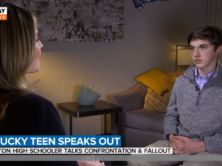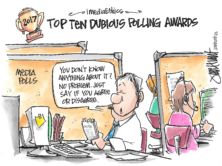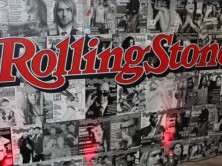As iMediaEthics previously reported, a University of California San Diego student may sue a student humor publication, The Koala over its “obscene” article and doctored photo of her. iMediaEthics wrote to the Student Press Law Center to see what it thought of the case since the student was told by university officials the newspaper was protected by the First Amendment.
SPLC’s executive director Frank LoMonte responded to iMediaEthics and while he wrote that he didn’t feel “comfortable” commenting specifically on the Koala because of any potential litigation, he did offer some comments regarding speech protections.
LoMonte wrote:
“As a general matter, even highly offensive, insulting and hateful speech is protected by the First Amendment as long as it does not cross the line into actually harassing or threatening identifiable individuals. It would be up to a judge and jury to determine whether The Koala crossed that line, but among the factors that would come into consideration is the context, and a magazine known by its audience to be dedicated to sophomoric humor typically has greater literary license than the 6 o’clock network news. That still doesn’t mean blanket immunity, and if the speech – even in a humor publication – actually crosses the line of creating a reasonable fear for personal safety, then the speech may be punishable.”
If the writing is protected by the First Amendment, then it can’t be censored by the university. “Once it’s determined that speech is protected by the First Amendment, then a public institution can neither censor it directly nor censor it indirectly by withdrawing financial support based on editorial content. If people on campus don’t like the publication, then among the legitimate responses is to boycott the publication and anyone who advertises in it,” LoMonte explained.
“Beyond the First Amendment, California has exceptionally strong laws that reinforce the rights of students by prohibiting censorship unless the students’ speech is unlawful or threatens to provoke a substantial disruption of school. Again, it would be up to a judge and jury to decide whether The Koala crossed that line, but typically speech is not held to be legally obscene if it carries any kind of an underlying message or point, even if the point is made very crudely using graphic imagery.”
LoMonte went on to comment:
“Certainly, as a practical matter, The Koala makes the job of defending the rights of student publishers more difficult. Like it or not, students are under a microscope that adult publishers are not. No one talks about taking away adults’ legal protections just because adult publish pornographic and violent material and therefore are untrustworthy with the freedom of speech. But people do harbor those beliefs about students, and courts and legislatures can roll back the protection of student expression if they become convinced that student speech is unworthy of the full dignity of the First Amendment. Publications like The Koala certainly can endanger public support for student press rights, just as we see that cyberbullying is undermining public support for student speech rights in some quarters. “






